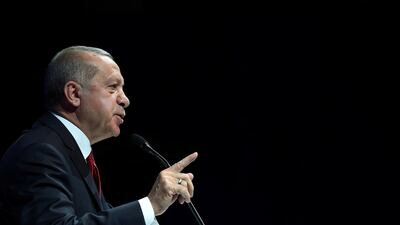A senior US delegation has made progress in its Syria talks with Turkey, a US official said, as a Senate committee on Thursday advanced David Satterfield's nomination as the next US ambassador to Ankara.
The US special representative for Syrian engagement, James Jeffrey, and special envoy for Syria, Joel Rayburn, ended a three-day visit to Turkey on Thursday.
They met senior Turkish officials including presidential spokesman Ibrahim Kalin, Defence Minister Hulusi Akar and Deputy Foreign Minister Sedat Onal.
A State Department official told The National that "the discussions were positive and productive".
Talks “focused on how we could advance issues of mutual concern in Syria, to include addressing Turkey’s legitimate security concerns, promoting stability and security in northern Syria as the US military draws down its presence".
Both countries are seeking to establish a safe zone in Northern Syria and in area under the control of Kurdish forces.
While no agreement was announced on Thursday, the official said discussions will continue.
Nicholas Heras, senior fellow at the Centre for New American Security, said that the policy gap between the two parties remains wide.
“The US team has a tall task in trying to convince President Recep Tayyip Erdogan that a token Turkish force in Syria satisfies his desire to look tough against the Kurdistan Workers' Party, while reassuring the Syrian Democratic Forces that it is not committing suicide by allowing the Turks such force,” Mr Heras said.
“Neither the Turks nor the SDF trust each other and they view the current situation as a zero-sum competition.”
Aaron Stein, director of the Middle East at the Foreign Policy Research Institute, was not optimistic about a safe zone agreement in the near future.
“The US is proposing a plan with a token Turkish presence to placate Ankara and to preserve the maximum pressure policy placed on Iran and the Assad government,” Mr Stein said.
“Turkey is proposing it takes over a zone with a token American presence to put maximum pressure on the SDF."
He said these positions were not compatible and so far neither party has made necessary concessions.
“Ankara has shown no willingness to entertain anything other than its vision for Syria," Mr Stein said.
"The same goes for the US, which is bending over backwards to try and figure out a way to get some Turks into the zone, but can't stomach Turks actually taking over the north-east."
The negotiations could gain impetus as Washington draws nearer to sending an ambassador to Ankara.
The Senate foreign relations committee voted favourably on the nomination of David Satterfield as the next ambassador.
The Senate will meet for a full vote in the next few weeks and the nomination is expected to pass.
At his hearing last month, Mr Satterfield warned Turkey against buying an S-400 Russian defence missile system.
"Turkey must choose – does it want to remain a critical partner in the most successful military alliance in history, or does it want to risk the security of that partnership by making such reckless decisions that undermine our alliance?” he said.
US national security adviser John Bolton also discussed the issue with Mr Kalın on Tuesday.
Turkish media alluded to a visit by US President Donald Trump to Turkey in July but a White House official did not confirm it.
The Senate committee also voted to advance David Schenker’s nomination as assistant secretary for Near East affairs at the State Department.
Mr Schenker served in the administration of George W Bush. He was nominated more than a year ago but Democrat Senator Tim Kaine delayed his nomination to try to obtain a legal memo from the White House on its cruise missile strikes in Syria.
The Senate will soon take a full vote on Mr Schenker’s nomination and he is expected to be confirmed.

